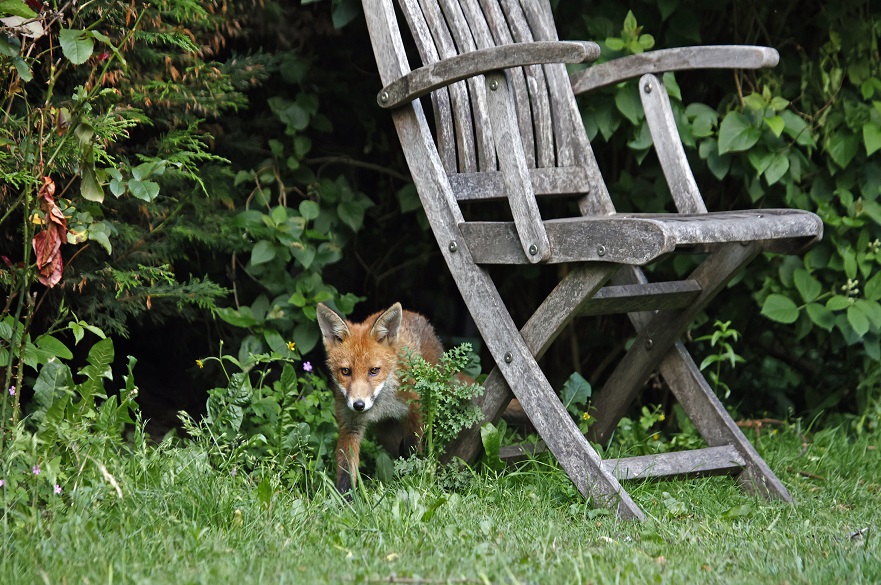Garden scraps: British wildlife clash over leftover food
Badgers, hedgehogs, foxes and cats are becoming embroiled in fights and stand-offs over food left in British gardens, a study has revealed.
By Dave Rogers | Published on 27 February 2023
Categories: Press office; Research; School of Animal, Rural and Environmental Sciences;

Wildlife conservation experts at Nottingham Trent University and the University of Brighton analysed hundreds of videos supplied by members of the public to investigate interactions within and between different species.
The researchers found that while food left by people in urban gardens – leftovers or commercially bought for this purpose – can provide benefits for wild animals, it can also bring competitors and predators into close proximity.
While badgers tended to dominate other species in the garden hierarchy, hedgehogs were also found to have more clashes than expected, the study revealed.
Aggressive and submissive behaviour among animals in the footage was found to be more common than neutral interactions – from 316 instances where animals were spotted together 175 ended in confrontation.
Animals were more likely to confront different species than their own. Cats and foxes were found to take a particular disliking to one another, with more than three-quarters of interactions (77%) sparking some form of aggressive or defensive reaction – with cats dominating foxes.
Badgers outcompeted all species in the contest for food – and to the research team’s surprise hedgehogs outcompeted cats. They suggest this may be due the fact that domestic cats are not as physically or behaviourally well adapted to defend themselves against hedgehog spines as wild predators.
Within the same species, hedgehogs were found to be the most combative – with more than half (55%) of interactions between hedgehogs leading to some form of aggression.
This included a characteristic behaviour termed ‘barge and roll’ by the researchers, whereby one hedgehog attacks another by running at it, causing the victim to roll up before being pushed away by the assailant.
The researchers suggest the purpose appeared to be to move a rival away from the food, such as to the edge of the garden. In one case, an individual was pushed down a flight of concrete, and another into water.
Within species, badgers were the least competitive with one another, with just seven percent of encounters resulting in a stand-off.
The researchers say that with regards to hedgehogs specifically – a declining species – understanding their behaviour and interactions is critical for informing conservation and welfare management, including feeding practices.
A badger, fox and hedgehog in a garden (footage not from study, courtesy Anna Champneys)
“Food provided by people may help wild animals but may also attract animals together that could compete, injure, or predate each other,” said Professor Dawn Scott, lead researcher from Nottingham Trent University’s School of Animal, Rural and Environmental Sciences.
She said: “The consequences of interactions between garden mammals are numerous and can become aggressive between competing species. It could lead to injury or death and increased competition might also reduce access to resources for subordinate species or individuals.
“Our study is the first to quantify interactions between urban mammal communities in this way and to identify hierarchical relationships between wild and domestic mammals in urban gardens.
“We need to better understand interactions between urban animals and the potential effects of providing food in this way, to ensure any potential risks are minimised.”
Dr Bryony Tolhurst at the University of Brighton said: “Feeding wildlife in gardens can also potentially unwittingly increase disease transmission between wild animals, and between wildlife and pets, by gathering them together.
“We need to understand the balance of costs and benefits of feeding animals in urban gardens, to properly guide people on how best to improve their welfare and conservation.”
The study also involved researchers from the University of Sussex and the Spanish National Research Council (CSIC).
It is published in the journal Animals.
Notes for Editors
Press enquiries please contact Dave Rogers, Public Relations Manager, on telephone +44 (0)115 848 8782, or via email.
Nottingham Trent University (NTU) received the Queens Anniversary Prize for Higher and Further Education in 2021 for cultural heritage science research. It is the second time that NTU has been bestowed the honour of receiving a Queen’s Anniversary Prize for its research, the first being in 2015 for leading-edge research on the safety and security of global citizens.
The Research Excellence Framework (2021) classed 83% of NTU’s research activity as either world-leading or internationally excellent. 86% of NTU’s research impact was assessed to be either world-leading or internationally excellent.
NTU was ranked second best university in the UK in the Uni Compare Top 100 rankings (2021/2022). It was awarded Outstanding Support for Students 2020 (Times Higher Education Awards), University of the Year 2019 (Guardian University Awards, UK Social Mobility Awards), Modern University of the Year 2018 (Times and Sunday Times Good University Guide) and University of the Year 2017 (Times Higher Education Awards).
NTU is the 5th largest UK institution by student numbers, with nearly 39,000 students and more than 4,400 staff located across five campuses. It has an international student population of 7,000 and an NTU community representing over 160 countries.
Since 2000, NTU has invested £570 million in tools, technology, buildings and facilities.
NTU is in the UK’s top 10 for number of applications and ranked first for accepted offers (2021 UCAS UG acceptance data) It is also among the UK’s top five recruiters of students from disadvantaged backgrounds and was the first UK university to sign the Social Mobility Pledge.
75% of NTU students go on to graduate-level employment or graduate-entry education / training within fifteen months of graduating (Guardian University Guide 2021).
NTU is ranked the second most sustainable university in the world in the 2022 UI Green Metric University World Rankings (out of more than 900 participating universities).